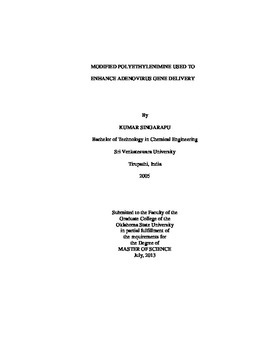| dc.contributor.author | Singarapu, Kumar | |
| dc.date.accessioned | 2014-09-24T14:18:39Z | |
| dc.date.available | 2014-09-24T14:18:39Z | |
| dc.date.issued | 2013-07-01 | |
| dc.identifier.uri | https://hdl.handle.net/11244/11187 | |
| dc.description.abstract | An improved adenoviral-based gene delivery vector was developed by conjugating adenovirus (Ad) with a biocompatible, grafted copolymer of polyethylene glycol (PEG) and polyethylenimine (PEI) (PEG-g-PEI). Although an Ad-based gene vector is considered relatively safe its native tropism, tendency to elicit an immune response, and susceptibility to inactivating antibodies makes the virus less than ideal. The goal of the present study was to determine if Ad could be complexed with a PEG-g-PEI copolymer that would enable the virus to transduce cells lacking CAR, the Ad receptor, while avoiding issues commonly associated with PEI. A copolymer library was synthesized using 2 kDa PEG and either linear or branched PEI (25 kDa) with a PEG to PEI grafting ratio of 10, 20, or 30. The results of the study indicate that PEG-g-PEI/Ad complexes are indeed able to transduce CAR-negative NIH 3T3 cells. The results also demonstrate that the PEG-g-PEI/Ad complexes are less toxic, less hemolytic, and more appropriately sized than PEI/Ad complexes. | |
| dc.format | application/pdf | |
| dc.language | en_US | |
| dc.publisher | Oklahoma State University | |
| dc.rights | Copyright is held by the author who has granted the Oklahoma State University Library the non-exclusive right to share this material in its institutional repository. Contact Digital Library Services at lib-dls@okstate.edu or 405-744-9161 for the permission policy on the use, reproduction or distribution of this material. | |
| dc.title | Modified Polyethylenimine Used to Enhance Adenovirus-Based Gene Delivery | |
| dc.type | text | |
| osu.filename | Singarapu_okstate_0664M_12394.pdf | |
| osu.accesstype | Open Access | |
| dc.description.department | Chemical Engineering | |
| dc.type.genre | Thesis | |
